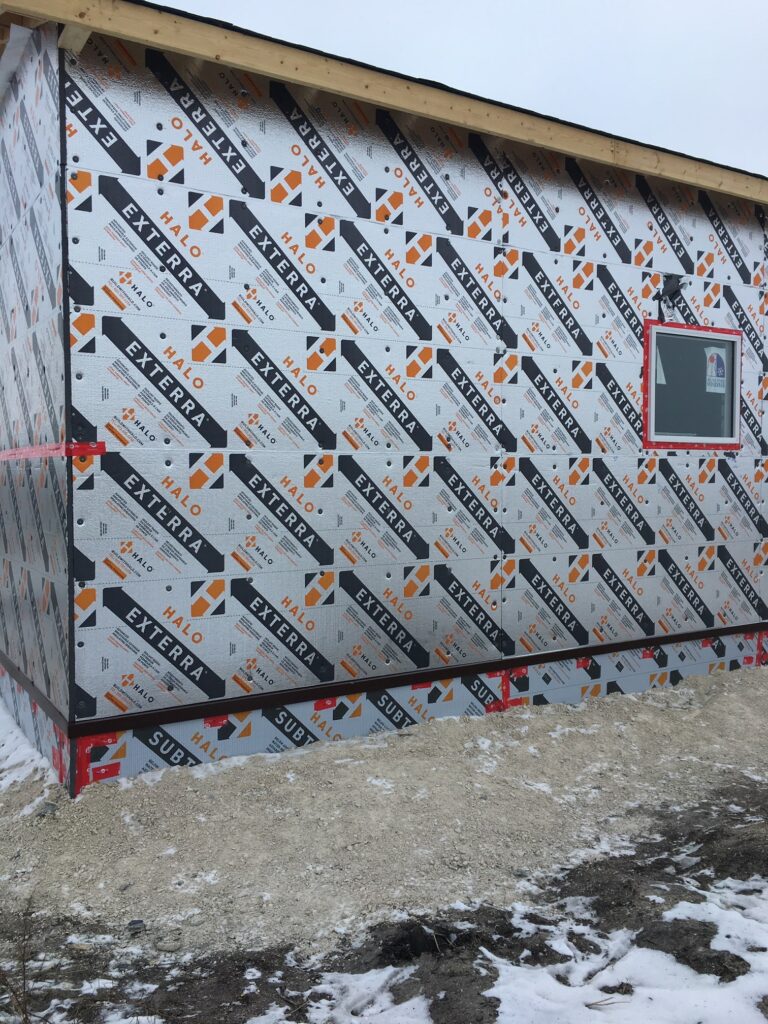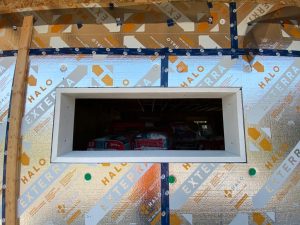Wondering whether Type 1 GPS or Type 2 Polyiso is the better fit for your next project?
To save you the time, we’ve prepared this side-by-side comparison between Type 1 Graphite Polystyrene (GPS), like the one used in Halo Exterra, and Type 2 Polyiso (Polyisocyanurate).
The comparison will touch on costs, availability, R-Values, strength, flexibility, and sustainability. (Note that our side-by-side analysis will only concern the foam core, not the laminate films used in the final foam board products.)
Cost
Polyiso is generally more expensive than GPS. It really depends on the region and the manufacturer, but you can expect to pay up to 40% more for a Polyiso board than a GPS board of the same thickness and R-Value.
Availability
Despite its higher price, Polyiso is currently stocked in more locations than GPS, and you may expect shorter lead times when ordering the product.
That said, 2021 brought about a severe shortage of Polyiso caused by the global supply chain disruptions.
Given the unpredictability of the current geopolitical situation and the economic volatility, it’s hard to foresee exactly how the availability of these two products will shape up in the near future.
To err on the side of caution, expect somewhat longer-than-normal lead times for both GPS and Polyiso for the time being.
Stability and Performance
Polyiso claims to have one of the highest R-Values per inch of thickness of all rigid insulation options.
However, its long term R-Value can be as much as 17% lower than its stated thermal resistance. This means that you’re paying more for Polyiso only to get a product with the same R-Value as GPS in the end.
The Building Science Corporation (BSC) has found that this disparity between the service and stated R-Values varies between different Polyiso manufacturers, but ultimately depends on the service temperature.
Notably, BSC found that Polyiso loses ~7% of its thermal resistance — dropping from R-6 to R-5.6 — when installed in warm climates. What’s worse is that Polyiso loses even more thermal resistance, dropping a whopping 17%, from R-6 to R-5, in cold climates.
In contrast, a 1-inch board of GPS has a thermal resistance of R-5, and this value remains stable in any weather conditions. What’s more, GPS retains its R-Value over time without degrading. So, with GPS you get precisely what you pay for — R-5 per inch of thickness.
Strength
Type 2 Polyiso has the upper hand over Type 1 GPS when it comes to compressive strength and flexural strength. However, GPS is still strong enough for most residential, commercial, and industrial applications, even serving as under-slab insulation without risk of damage.
Here is how the 2 products compare:
GPS vs. Polyiso
Compressive Strength
- Polyiso — 16-20 PSI
- GPS — 10 PSI
GPS vs. Polyiso
Flexural Strength
- Polyiso — 40-95 PSI
- GPS — 25 PSI

Flexibility
GPS-based insulation products are generally more flexible than Polyiso. In fact, Halo’s Exterra — a type of GPS foam board — has been used to insulate radius walls in the place of Polyiso.
On that project, the contractor was experienced enough to know that Polyiso would require extensive field-cutting to fit a radius wall, whereas GPS-based Exterra would fit nicely without breaking.
Other Applications
Polyiso may not be ideal for radius walls, but it’s an excellent choice when you’ve got a bitumen membrane getting hot-mopped on top. If you’re using Polyiso under hot tar, you can rest assured that your insulation won’t melt or break down in any way.
Sustainability
Overall, Type 1 GPS scores higher than Type 2 Polyiso across several sustainability metrics, such as embodied carbon content, water used in manufacturing, and the use of raw materials.
For example, Polyiso packs 24% more Global Warming Potential (GWP), which is measured in embodied carbon content. While GPS contains 1.87 kg of CO2 per kg (i.e. 1.87 kg CO2 is released to produce 1kg of GPS), Polyiso contains 2.32 kg of CO2 per kg.
In water consumption, Polyiso also scores worse. It requires 0.16m3 of water per a 1m2 sheet of the product that’s 38mm thick, whereas only 0.00649m3 of water is needed to produce an equivalent GPS board. This means that manufacturing Polyiso requires 24 times more fresh water than producing GPS.
As for raw materials, Polyiso does contain some recycled content, with roughly 3.9-10% of pre-consumer material, depending on the manufacturer. However, some Polyiso manufacturers also use red-list materials to produce Polyiso.
Wrapping It Up
There you have it — we’ve compared Type 1 GPS against Type 2 Polyiso across several key metrics:
Polyiso is strong and easy to source, but costs more and has unstable long term thermal resistance.
Meanwhile, GPS’s R-Values are more steady, it’s more flexible, is more sustainable and has less global warming potential and costs less.
Strategic Placement of House Wrap with Halo’s Exterra for Enhanced Building Protection
In 2024, optimizing your home’s insulation and moisture barrier strategies remains crucial, particularly when considering Halo’s Exterra as a pivotal component of your construction approach.
Comparing Halo Exterra by Logix Brands and Comfortboard 80 by Rockwool
Insulation plays a pivotal role in residential construction, affecting a building’s energy efficiency, safety, comfort, and environmental impact. The debate between Halo Exterra by Logix
Revolutionizing Basement Renovations: A Comprehensive Guide to Insulating and Flooring Your Existing Concrete Slab with Halo Interra
Transforming your basement is not just a home improvement project; it’s an investment in your property’s value and functionality. This guide focuses on basement finishing,









